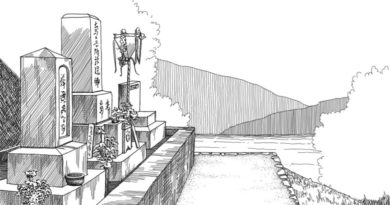Calling Ariane
My wife collects strays. A small Parisian dancer standing at the side of a coastal road, with a sign saying Peace Park. A German in the dunes of Shimane with his young son, an engineer at a hot springs hotel restaurant, five weeks into a six month job on a tiny island in the Inland Sea and nearly deranged for lack of conversation. Last year we even had a man from just northeast of Marseilles stay with us for several days as he bicycled most of the length of Japan.
Of course, such people have to want to be collected. It’s a style of travel I’ve never had the temperament to practice but have always envied. That willingness to throw yourself into the air and see who catches you. I watched Yannick, our French bicyclist, approach one stranger after another and try to strike up conversations. He was delighted when it worked, and utterly unperturbed when it didn’t. My guess is that you end up with a more intimate experience of a place when you can roll this way. At the very least, you make more personal connections, and some of those relationships last for years. In fact, the first place Yannick had stayed on his jaunt across Japan was in the home of a retired salary man he had met bicycling in the opposite direction on a rutted track in Cappadocia.
On the website for something called the “Laboratory for Experimental Tourism” in France, you’ll find lists of dubious ideas in seven different languages. There’s some overlap, but it’s not complete. On some pages, for example, an item called “Breadcrumbs” suggests that, upon arriving in a new city, you search the phonebook for someone named Ariane. Call Ariane up and ask for her ten favorite places. If she volunteers to come along, so much the better. Another suggestion is to spend the day in bureaucratic spaces like social services centers or city hall, sampling the sandwiches in the canteen and making liberal use of any copy machine you stumble across. These are two of the more practicable ideas. Silly, but it does point to a jadedness among some travelers, who are weary of just seeing the approved sights (another recommendation is to visit those places and take only photographs with your back turned to them) and checking in and out of budget accommodations. In my own case, my one talent as a traveler has been to get away with ignoring signage, taking photos where I’m not supposed to or pushing through doors into the back rooms of museums and the administrative offices at major shrines. In Japan, especially in little neighborhood restaurants, this will often bring you to the foot of the owner’s unmade bed. Not exactly the stuff of spellbinding travelers’ tales.
How much easier and more pleasant to just talk to people, if you can. Maybe some of you reading this travel this way, expecting and finding hospitality far from home. You’d have to meet more people like my wife and fewer people like me to make it work, but with a bit of luck it must be quite wonderful. It’s also a style of travel that builds bridges between people (which is the hope that makes many of us pack our bags, surely) rather than just involving a transfer of cash. Instead of simply leaving behind the better part of a month’s paycheck, you become a real if temporary presence in the lives of those you travel among.
It probably works best for a single traveler. It would be harder for a couple, and nearly impossible for a large group without a level of organization that would make it a different experience entirely. A few weeks ago my youngest daughter and I slipped off to Shukkeien for a picnic. Just outside the fence, a European couple had overnighted on the riverbank and were breaking camp. As they carefully stowed their clothing and folded their tent, they were in the midst of a savage argument, snarling at each other to my little girl’s delight. At home, they might have retired to their respective corners. On the road that’s harder to manage. Coiled and hostile as they were, it seems unlikely they were open to much of anything, at least for that afternoon.
I’m not suggesting solitude and self-reliance as a model. That can too easily turn cripplingly lonely, even dangerous. Every great travel story involves a cast behind the lead character. But commercial travel means that much of that help can be bought pre-packaged, making accidental discoveries and personal connections more difficult to come by, or even burdensome. Better, perhaps, just to pick up the phone and give Ariane a call.





